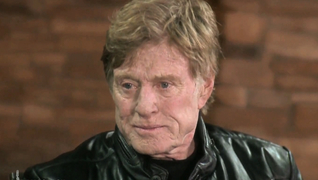
We’re broadcasting from Park City, Utah, home of the Sundance Film Festival, the nation’s largest festival for independent cinema. Over the weekend, we spoke with Robert Redford, the founder of Sundance. He’s well known as an actor, a director, a producer, but part and parcel of who he is is an activist. We asked him about President Obama’s decision last week to reject the proposal for the Keystone XL tars sands oil pipeline from Canada to the Gulf of Mexico. “Oil, coal and gas still dominate, in terms of control, because of their relationship with members of Congress they give a lot of money to,” Redford said. “But because times have changed so drastically, and I don’t think we can be at the mercy of what Big Oil wants to do anymore.” [includes rush transcript]
Transcript
AMY GOODMAN: We’re at Park City Television in Park City, Utah, home of the Sundance Film Festival, the largest festival of independent cinema in this country. Over the weekend, I spoke with Robert Redford. He is the founder of Sundance Film Festival, well known as an actor, an Academy Award-winning director, and a producer. We sat down in the opening days of the film festival to talk about politics and his life. Over these next few days, we’ll play excerpts of that interview.
Today we’re going to begin with a conversation around President Obama’s decision to reject the Keystone XL pipeline that would go from Alberta to the Gulf of Mexico. Robert Redford has weighed in on this, written columns, posted podcasts about it, a well-known environmentalist. He talked about the significance of this decision.
ROBERT REDFORD: I think it’s important because it ties to a number of crucial things. One is what kind of information gets to the American public that’s really the truth, that’s going to relate to what happens to their environment, which has already been so degraded over the years that we—there’s less and less planet to live on. And if anybody is thinking about their children or the children to come beyond that, then they should start thinking about what they’re going to provide for them to live on. And it’s the greed and the corporate control of profit, which was fine up to a point during the Industrial Revolution—I mean, that was great, helped this country grow strong and so forth—but you have to look at the other side of it now, and it’s kind of grim.
So this—this, to me, was an example of one of the big interests that I think has a lot of control over the country, certainly politically, which is Big Oil. Oil, coal and gas still dominate, in terms of control, because of their relationship with members of Congress they give a lot of money to, the jobs they claim they create, and so forth. But because times have changed so drastically, and I don’t think we can afford to be at the mercy of what Big Oil wants to do anymore, it’s a question of, “OK, you’ve had your thing.” Now, if you just want to look at a real simple equation, which is what got me involved in the environment in the first place, it’s really simple. You have non-renewable energy sources, and you have renewable energy sources. And when I saw a map in the late '60s about that, I thought, “Wait a minute, all of our energy is going to non-renewable energy sources. Why are we not considering that it's non-renewable for a reason? It’s going to go out someday. And it’s polluting our environment. It’s creating health hazards and so forth. Why would we not be switching to renewable?” And that’s when I realized how politics plays its role in it. So, from that time on, I’ve been pretty active in trying to have a hard look at the environment and human rights. But those are the two areas that I’ve been focusing on.
So, right now, here’s this glaring example of what’s wrong. And that is, if you look at the facts, it’s a terrible situation—if the facts can get out there. But the facts are so busy being distorted, exaggerated, or just lied about by the other side, who has a more commanding presence on the airwaves and so forth, you’ve got a serious situation. And so, my effort to come out is, please look at the facts. Don’t look at—when you have people like Mitch McConnell, you have people like Boehner, Gingrich, who’s his own—he’s a whole other issue—but when they exaggerate the truth, or fabricate it, or just out-and-out lie about the actual facts, then you’ve got to step up and say, “Wait a second. That’s not the truth.” So, what is the truth? And there is a lot of untruth being propagated by these people about this pipeline, 1,200 miles of crude oil, which is the dirtiest oil on the planet, being shipped from Canada, that wants to get to the ocean, to Houston. And for what? It’s not going to put any—it’s not going to put any gas in your tank. It’s oil that’s going to be exported to other countries. So, what is the point? In the meantime, it’s going to run through the heartland of America. And don’t tell me there won’t be any leaks. Of course there will be leaks, because we’ve seen it all over the map in recent months, years. So I just figure, OK, the American people will decide.
AMY GOODMAN: Actor Robert Redford. We will play excerpts of this interview throughout the week.












Media Options